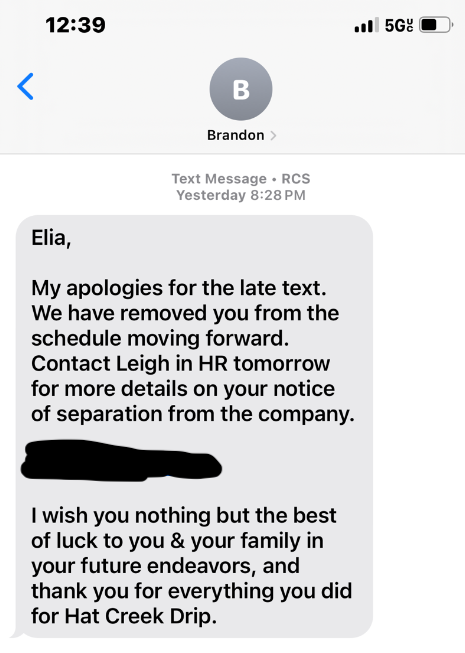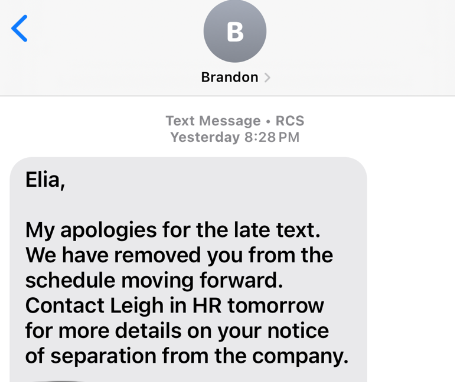Part 2: From Warning to Termination – How the Firings of Immigrant Employees Highlight the Risks of a Weak Workplace Communication Policy and the Dismantling of DEI Programs
The recent termination of immigrant employees from a Central Texas fast food chain after participating in A Day Without Immigrants highlights a critical issue: the lack of adequate and equitable communication within diverse workplaces. This case exposes two significant concerns regarding diversity, equity, and inclusion (DEI) in workplace communication—first, the failure to communicate policies clearly to a predominantly Spanish-speaking, immigrant workforce, and second, the inappropriate use of text messaging as a platform for delivering company policies and employment decisions.
A Failure to Clearly Communicate Company Policy
Company leadership and store management that hire a majority of Spanish-speaking immigrant employees must clearly communicate company policy, particularly when employees seek clarification about the consequences of absences to observe a community protest. In this incident, the assistant manager, serving as the intermediary, was told over the phone that the consequence would be a written warning in the employee’s file. The store manager, requesting a list of employees planning to participate in the community protest, should have followed up with each employee with, at minimum, a telephone conversation. However, the store manager chose to communicate via text message the next day, and the messages were inconsistent. Some employees received messages in English, others in Spanish, announcing that the protest day would also be designated Employee Appreciation Day. The official messages did not clearly define the company’s attendance policy, only reiterating that an unexcused absence would result in a report. Without precise policy wording or additional clarification, employees accepted the consequence as initially stated and remained united in their decision to participate in the protest.
“Me contestó por mensaje que tendría que firmar una advertencia por faltar. Nunca me dijo [que] ‘ya no tienes trabajo.’” ~ Gudelia, immigrant employee

Inappropriate Use of Text Messaging for Critical Workplace Communication
A second issue that is equally concerning is a company’s choice of platform for communicating policy and terminations. Text messaging should never be an appropriate medium for delivering critical employment decisions. In this case, employees were not given an opportunity for an in-person conversation or even a formal written notice before receiving a text message from a district manager stating they had been fired. The assistant manager, the intermediary, who did not participate in the community protest, was also terminated via text and was given no chance to explain his involvement and perspective of the incident.
In an era where misinformation and miscommunication are national concerns, it is no surprise that company leaders and team members were not on the same page. The lack of professional and transparent communication methods contributes to misunderstandings, fear, and mistrust. This incident highlights why strong DEI policies are essential—not just for employee relations but for the overall success of a business. When communication practices fail to consider linguistic diversity and appropriate professional standards, companies suffer from unnecessary turnover, financial loss, and damaged reputations.
“My apologies for the late text. We have removed you from the schedule moving forward. Contact …HR tomorrow for more details on your notice of separation from the company.” ~ Brandon, District Manager

The Business Case for DEI in Workplace Communication
The need for DEI in workplace communication is undeniable, particularly in industries reliant on immigrant workers. In Central Texas, where the labor market is already strained, companies cannot afford to lose valuable employees due to ineffective communication. High employee turnover due to miscommunication is an avoidable and costly mistake. Yet, some companies are choosing to dismantle DEI programs despite the clear business advantages they provide.
Leaders must recognize that today’s workforce does not look the same as in the past. Companies must adapt to the realities of a diverse labor force by implementing clear, equitable, and inclusive communication strategies. This means ensuring all employees fully understand policies, providing information in appropriate languages, and using professional, transparent platforms for critical workplace discussions. Businesses that fail to embrace these DEI principles will continue to face high turnover, reduced employee morale, and reputational damage.
The terminations at this fast-food chain serve as a powerful reminder: without diversity, equity, and inclusion in workplace communication, companies risk alienating and losing the very workforce that keeps their businesses running.
If you enjoy my stories and value the art of writing, you can support my craft by sharing this story and/or buying me a cup of café con leche.

